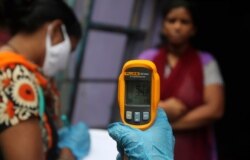India has surpassed Russia to become the third worst-affected country by the coronavirus pandemic, as reopening the economy brings a surge in infections, and the country’s southern states emerge as new hot spots.
It is not just the number of COVID-19 cases that is worrying officials — the pace of increase in the world’s second most populous country is now one of the highest.
The sharp rise in new infections has prompted several states in the country such as Kerala, West Bengal, Assam and Jharkhand to reimpose lockdowns in their worst-affected areas.
India’s count of about 700,000 cases now puts it only behind the United States and Brazil.
“We are racing toward the peak, which we can expect around early August,” said Dr. T. Jacob John, one of the country’s prominent virologists. “But even after the peak, we will continue to see a significant number of infections in the coming months, going into next year.”
The numbers have spiraled, as businesses reopen and traffic returns to the streets. From restaurants to shopping malls and offices to religious places, most parts of India have lifted restrictions to restart an economy that was battered by one of the world’s strictest and longest lockdowns.
New record daily highs in infections were recorded over the weekend, when authorities reported over 24,000 cases.
Much of the surge is coming from four southern states — Andhra Pradesh, Tamil Nadu, Karnataka and Telangana.
And while India’s teeming cities, home to millions of people, remain the epicenter of the pandemic, outbreaks are also being reported in its vast countryside.
Officials say the increase in cases is also partly the result of increased testing that India is now conducting. In the early days of the pandemic, testing was severely limited due to a lack of facilities.
There is a silver lining: Although cases are galloping, India ranks relatively lower in the number of lives that the virus has claimed. Nearly 20,000 people have died so far.
As India grapples with the pandemic and its health infrastructure comes under increasing strain, public health experts have stressed the need to educate people about wearing masks.
“The lockdown made people believe that the virus would be defeated. They did not understand properly that they must continue taking precautions,” said John, who helped lead efforts to control HIV/AIDS in India. “Just as we taught people the need to use condoms for safe sex, we need to make people understand that the mask is the best way to reduce transmission of COVID-19. It is the social vaccine that is the need of the hour.”
In an address to the nation last week, Prime Minister Narendra Modi warned that the country is at a critical juncture in its fight against the virus, but many were not following guidelines to prevent its spread — wearing masks, washing hands and maintaining social distancing.
“People are becoming careless. We need to call out the violators,” Modi said, urging local administrations to be more stringent in enforcing these measures.
India is continuing to reopen more public places, despite the rise in cases, as it focuses on bringing back jobs and reviving the economy.
On Monday, many historic monuments were given the green signal to open. However, authorities in Uttar Pradesh state said that India’s most iconic tourist spot, the Taj Mahal, would continue to remain shut.
Meanwhile, the capital city on Sunday opened a “plasma bank.” Plasma from patients who have recovered from COVID-19 is being administered under a trial program in several hospitals to treat moderate to severe cases in the hope that the antibodies in the plasma could reduce the number of deaths.
Chief Minister Arvind Kejriwal appealed to people to donate plasma, saying the number of patients needing it is more than those donating it.
"I urge all those who are eligible to come forward. It will not cause any pain or weakness. Those donating plasma are doing selfless service to society," he said.
Delhi is one of the worst-affected cities in the country, accounting for nearly 100,000 COVID-19 cases.





